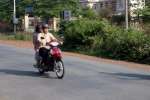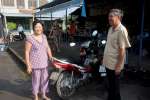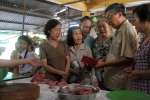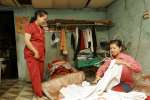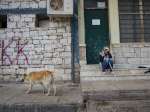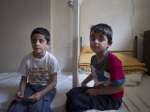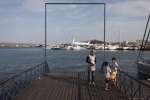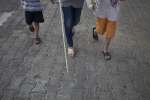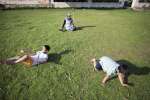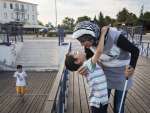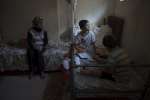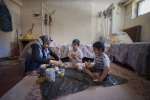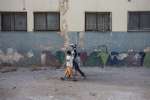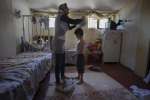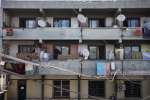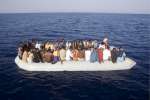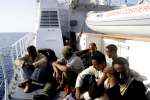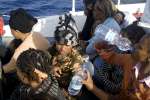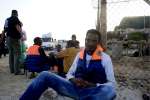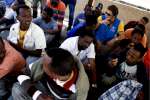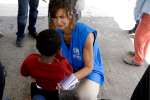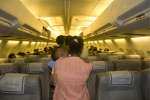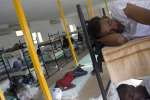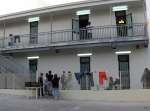- Text size
 |
|  |
|  |
| 
- عربي
Mediterranean crisis sees former Vietnamese boat person break long silence
News Stories, 6 July 2015
COPENHAGEN, Denmark, July 6 (UNHCR) – Harrowing images of the Mediterranean boat crisis has brought back "bitter sweet" memories for Anh Lê, one of Denmark's most famous Vietnamese restaurateurs, who crossed oceans herself to arrive where she is today.
Aged five, she was forced to flee Vietnam by boat with her family. Braving pirates, storms, rejection and an ever-present fear of violence, she found success and happiness in her adopted land.
Now after years of silence about her ordeal, and spurred on by horrific events in the Mediterranean, she feels she has been forced to speak out.
"I really never talk about this, for many years my parents didn't either. It was too horrible. But somehow this crisis in the Mediterranean … you get affected. I think I hide a lot of things, there are a lot of things I'll never really get over, but I was one of the lucky ones," she explained.
Now 42, the self-taught cook and cookbook writer regularly appears on television to share modern Vietnamese recipes with her Danish audience in her show "Spis Vietnam". Her story is one of hope and triumph But she has never forgotten the past.
"The news and the photos of people overfilling small boats, people swimming desperately from sunken vessels towards the coast to survive, the image of bodies – especially children's bodies – floating in the sea awoke my memories. It made me sad and compelled me to speak out," she told UNHCR in a recent interview.
Anh hopes that by sharing she can shift the focus from negative depictions of asylum-seekers to a narrative of asylum-seekers and refugees as contributors to society, rather than burdens.
"I thought in many naive ways that the world had learned something from the Vietnam War (and many other wars) and the boat people ... But it is clear we need to talk about this. We need to let people know that it could be you tomorrow. There is not any perfect solution, everyone is afraid of losing something if we open up … but we need to find a solution," she added.
Her own intimate knowledge of what it means to flee your home and become a refugee prompts her to react strongly to some comments in the media suggesting people are shopping around for the best place to seek asylum.
"I think those people at that time don't think 'What country should I choose? Where can I get the most money?' They just think 'I want my children to be in a place where they are safe'," she explained.
Anh's own flight began because her father served as an officer in what was then the South Vietnamese Navy which was allied to the United States. After the war ended in 1975, he was sent to a camp.
Eventually, he met a Chinese businessman who had built a ship, and due to her father's experience in the navy, offered him a place on board in exchange for sailing it. Anh and her three brothers who ranged from six years to nine months old took off with him. "When people asked 'why are you taking your family with you?' my father said 'If I leave, they die. If I take them, they die with me´" said Anh.
Her father believed the risk was worth giving his children a chance at a better, safer life. The boat was filled with over 1,000 people.
In a situation eerily close to the current crisis in South East Asia today, Anh's boat was refused by Hong Kong, Malaysia, and Indonesia. After 14 days of sailing from place to place, water had run out and food was scarce – the situation was becoming desperate.
"People were going to the toilet on the ship, they were tired, and there were far too many people. You couldn't walk or breathe." With the help of others on board, Anh's father managed to defend the ship from pirates, but time was running out.
Eventually, her father made the decision to purposely sink the ship just off the coast of Indonesia so that it could not be dragged back out to sea. Most of the people on board couldn't swim, so those who could spent the day swimming back and forth between the beach and the boat, helping their fellow passengers to safety.
Anh, her family, and the other survivors were taken to an Indonesian refugee camp. They spent three months sleeping on the ground of a tent they shared with four other families. As they didn't have any money, the family survived on fish that their father caught in the night. There were mosquitos, and it rained constantly.
Then came the news that the family was to be resettled to Denmark in 1979. "They sent us on an SAS flight to Copenhagen," said Anh with a smile. "It was like we were in heaven. The flight attendants came, it felt like every five minutes, to ask 'what do you want to eat or drink? It was the most beautiful experience."
After a short stay in Copenhagen, the family was sent to Aalborg in the north of Denmark where they built a new life and quickly integrated into Danish society
After school Anh lived in the United States, Vietnam, and France, before returning to Denmark in 2003. "I'd already decided with my brothers to open a restaurant in Copenhagen. That was the beginning, and it's been hard work ever since, and a lot of fun, and a lot of craziness!" she laughed.
She also donates her time, and all the money she's made from her cookbook to help children in developing countries through SOS Children. Then the Mediterranean sea crisis worsened in 2015. Anh made the painful decision to speak out for the first time about her own experiences.
"It's very important to remember that it could be us," she said. "Yes, it's very good that you can live in a safe and secure country, but you never know when your house is going to shake."
By Michelle van der Meer, Copenhagen, Denmark


